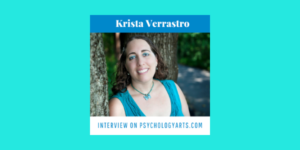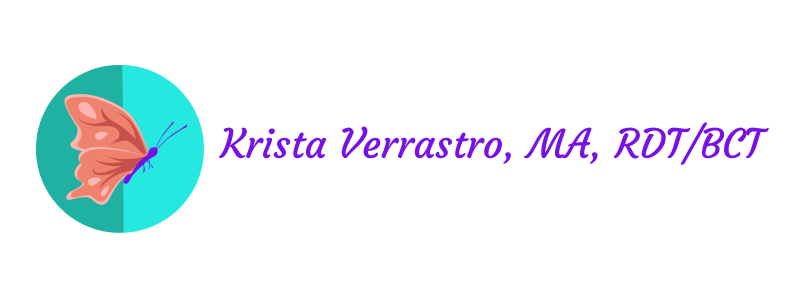
Have you ever wanted to know more about me or my work? If so, read this interview I did with Psychology Arts (whose website is unfortunately no longer active as of 11/1/19).
What do you do? Who do you help?
I mix drama therapy, talk therapy, and EMDR therapy to help people of all ages move forward in life. I help them get unstuck, find their voice, and have better connections with themselves and others.
List your favorite therapeutic tools.
As someone who went into the field of drama therapy because I personally experienced the healing power of the arts in my youth, my favorite therapeutic tools tend to be creative ones. This includes role playing, storytelling, mask making, collage making, exploring roles and stories in a sand tray, creating and performing healing rituals, creating grounding objects, and using poetry and other creative writing in sessions.
It thrills me that recent studies have shown that such creative and somatic interventions are better than solely using talk therapy for treating trauma and other distressing experiences, as this is something I knew intuitively for a long time.
What is a good course, website, or book you would recommend and why?
When it comes to the creative arts therapies, there are so many great resources! For good courses, I recommend that therapists on the East Coast look into trainings through Chesapeake Beach Professional Seminars because they provide several great creative arts therapy workshops. I myself lead workshops about drama therapy and specific populations.
One website that I recommend for creative arts therapists who are in private practice or are thinking about private practice is the Facebook group I run called Creative Arts Therapists in Private Practice. It is a wonderful community of supportive and talented professionals!
A great book that I recommend, for both mental health professionals and the general public, is Bessel van der Kolk’s The Body Keeps the Score. It provides information about the causes and impacts of trauma as well as the most effective treatments for it, which include creative arts therapies.
What makes your practice unique?
Being a drama therapist alone makes my practice unique since there are less than a thousand of us in the country!
Aside from that, here are some other aspects of my work that make my practice unique: my specialty working with survivors of abuse, my specialty working with people who feel different (especially vegans since I am vegan myself and understand the particular challenges that vegans face), and the fact that I try to incorporate nature into my therapy work (through sessions held in parks or outside of my office as well as through using nature metaphors/symbolism in sessions).
What advice would you give to other creative arts therapists?
Don’t get discouraged by the constant explaining you might have to do about your work.
Be proud of the work you do and get comfortable advocating to other professionals, potential clients, legislators, and anyone else who might not understand the creative arts therapies very well.
Turn to your community, both in your specific field and in the creative arts therapy field at large, when in need of support surrounding this issue.
What is your self-care routine?
These are some of my favorite ways to practice self-care: walking, hiking, spending time in nature, traveling (especially to national parks), reading, watching movies, listening to music, attending concerts and live theater, being creative (e.g. writing poetry, coloring, making crafts, etc.), socializing, deep breathing, drinking tea, and getting monthly massages.
List the products or items that are indispensable in your life.
As someone who loves pleasantly scented and flavored things, let’s just say it’s a necessity for me to have a variety of the following for my self-care: lip balms, candles, and tea. It’s important to me to have vegan and natural versions of these things, but I tend to prefer unique scents and flavors.
Some of my current favorites of these things at the moment are hot chocolate lip balm by Crazy Rumors, tree scented candles in various brands (e.g. fir and pine), and blueberry muffin tea by Teekanne… all lovely things to get me through the winter, as I’m writing this in chilly January!
Regarding items that are a necessity for my work, I’d say the following are most important for drama therapy interventions: art supplies, puppets, masks, and scarves.
One of my favorite items to use in therapy sessions are conversation cards, such as the Ungame card sets and Describe card sets.
Another item that my clients and I love are the affirmation stones that I’ve collected during my travels, which are used as an ending ritual for clients who choose to have a positive message to end their session with.
Who influences your work and why?
Regarding my influences in the creative arts therapy community, I honestly think my colleagues inspire me the most. There are so many people doing important and innovative work that helps people! These are people that I connect with through social media (especially Facebook groups for therapists) and at workshops and conferences. As creative as I am and even though I come up with a lot of unique interventions on my own, I definitely use a lot of interventions that I learn from fellow therapists that are eager to share their wisdom.
Regarding my influences from the psychology field in general, the following people and concepts are among many that have influenced my work: Carl Jung, Sigmund Freud, Bessel van der Kolk, Bruce Perry, Judith Herman, Brene Brown, Barbara De Angelis, John Gottman, mindfulness, EMDR, CBT, DBT, ACT, ecotherapy.
Although I believe in a “bottom up” approach like van der Kolk and Perry, meaning that self-regulation is best treated through somatic methods as opposed to talk therapy interventions, I do believe that approaches like CBT and DBT have their time and place in therapy. In addition, many of us creative arts therapists have found ways to use such concepts in our work to combine the somatic and cognitive aspects.
List your social media platforms and website(s).
Website: www.kristaverrastro.com
Facebook: @kristaverrastrotherapy
Instagram: @kristaverrastrotherapy
Contact me
If you are looking for a therapist in Reisterstown / the Baltimore area and think we sound like a good fit, contact me for a free consultation.
